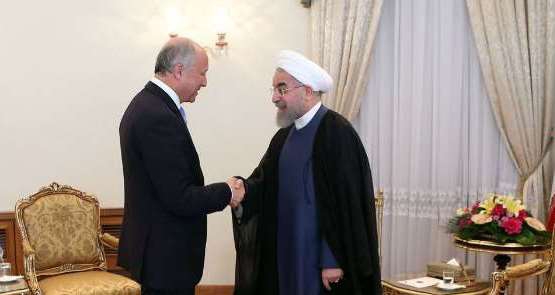�The nuclear agreement should mark [Iran�s] better cooperation with Europe,� Rouhani said in a meeting with visiting French Foreign Minister Laurent Fabius in Tehran on Wednesday.
On July 14, Iran and the P5+1 countries � the United States, Britain, France, China and Russia plus Germany � finalized the text of an agreement, dubbed the Joint Comprehensive Plan of Action (JCPOA), in the Austrian capital of Vienna.
Under the JCPOA, limits are put on Iran�s nuclear activities in exchange for a set of commitments by the P5+1, including the removal of all economic and financial bans against the Islamic Republic.
Rouhani said that Iran-France cooperation over the Vienna agreement should constitute the base for future relations on the basis of mutual trust.
He said that the nuclear agreement benefits Iran, the P5+1 countries and all regional players, adding that it is a significant step in turning threats into opportunities.
The Iranian president also urged all countries involved in the nuclear talks to do their utmost to �safeguard the agreement.�
�The Iranian government is steadfast in the path of [implementing] the agreement, and we will fulfill our commitments as long as the opposite side is committed to its obligations,� Rouhani said.
[caption id="" align="alignnone" width="555"]
 Iranian President Hassan Rouhani (R) shakes hands with French Foreign Minister Laurent Fabius in the Iranian capital, Tehran, on July 29, 2015.[/caption]
Iranian President Hassan Rouhani (R) shakes hands with French Foreign Minister Laurent Fabius in the Iranian capital, Tehran, on July 29, 2015.[/caption]Fabius, for his part, said that French companies are eager to return to the Iranian market for job-creating investment, stressing the need for Paris to make up for lost opportunities in relations with Iran.
He also invited Rouhani to visit France on behalf of French President Fran�ois Hollande.
The French foreign minister arrived in the Iranian capital, Tehran, on Wednesday for a day-long visit to hold talks with the country�s high-ranking officials.
Earlier in the day, he held talks with Zarif and then attended a joint press conference with his Iranian counterpart.
Fabius� visit to Iran is the first by a French foreign minister to the Islamic Republic in 12 years.
Fabius� visit to Iran, which comes at the invitation of his Iranian opposite number, has raised some criticisms in Iran, especially over France�s hard line towards Iran in the course of negotiations over Tehran�s nuclear program.
Days before the conclusion of the talks on July 14, Fabius urged other negotiators to take a tough stance on Iran, insisting that Paris will not sign off on a deal if Tehran rules out inspections of its military sites as part of the final agreement.
Fabius is also under fire for his role in the export of HIV-contaminated blood products to a number of countries, including Iran, in the 1980s, when he was in office as France�s prime minister.
By Press TV











